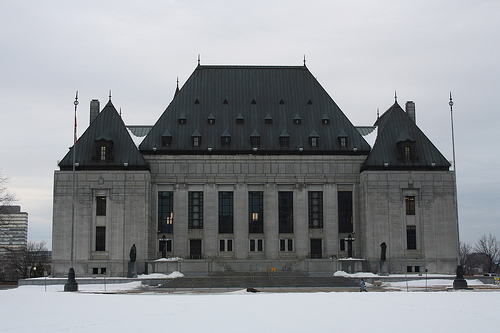You can change the conversation. Chip in to rabble’s donation drive today!
The trio of cases that are appearing before the Supreme Court of Canada (SCC) will test the bounds of section 2(d) of the Charter, the freedom of association — the Charter section that protects Canadians’ right to join trade unions.
The same right does not extend to union activities. In 1987, the Supreme Court determined through a trio of cases that section 2(d) does not protect the right to strike or bargain collectively.
It’s why federal and provincial governments have been able, many times, to legislate strikers back to work. While observers may feel that this unjust, based on the 1987 ruling there is nothing unconstitutional about creating a law that can force workers off the picket lines and back to their offices.
Subsequent rulings have found that there is a procedural right to bargain collectively that exists under the freedom of association. However, many believe there it is still room to clarify the extent of the powers laid out in section 2(d).
“The state of the law is anything but settled,” said E. Wayne Benedict, a lawyer with McGown Johnson in Calgary who specializes in labour law. He thinks that the decisions in the three cases will clarify or alter the court’s position on how far freedom of association extends.
In February, the SCC will hear the first pair of cases in the trio — they deal with the rights of Royal Canadian Mounted Police (RCMP) to organize and bargain collectively.
Under RCMP regulations, employees can only negotiate with management through the Staff Relations Representative Program, whose officials are elected from amongst the employees. Two provincial RCMP unions — The Mounted Police Association of Ontario and the British Columbia Mounted Police Professional Association — are arguing that the regulation limits their ability to bargain collectively on behalf of their members.
In the second case, RCMP employees are arguing that the Expenditures Restraint Act, which legislated reductions made to the RCMP pay package by the Treasury Board, constitutes a violation of the Charter.
In both cases, the employees are going to have to prove that what management did interfered significantly with their ability to bargain collectively. If the SCC rules that the allegation is true, it will give a significant boost to other unions who are fighting similar battles right across the country.
The third case, tentatively scheduled for May, takes on the accepted jurisprudence that the right to strike is not protected by the Charter.
The Saskatchewan Federation of Labour (SFL) is challenging Public Service Essential Services Act. Enacted in 2008, the law allows the Saskatchewan government to dictate what employees are essential workers, should the employers and the workers not come to an agreement 30 days in advance of a strike.
SFL contends that with this law the Government of Saskatchewan is striking at the heart of freedom of association because it stops people from being able to participate in their unions through collective action.
A Regina Court of Queen’s Bench agreed with the SFL, ruling in February 2012 that section 2(d) does include the right to strike. The ruling was overturned after an appeal by the Government of Saskatchewan. But the ruling was overturned by an appeal court judge.
The case is now before the SCC. Should the Court overturn the Court of Appeals decision, the scope of freedom of association will change, as will the ability of labour unions to bring actions based around the right to strike.
The outcome of all three SCC cases could have immediate repercussions for cases that have just started to make their way through the courts. For example, in Alberta, where a pair of controversial bills — Bill 45 and 46 — are currently being challenged by two separate public sector unions.
“The Saskatchewan decision will certainly influence the outcome of a challenge to Bill 45,” said Benedict. Bill 45 in Alberta imposes large fines on unions that engage in illegal or wildcat strikes.
Benedict explained that in order to successfully challenge Bill 45, the case would likely have to prove that the right to strike is constitutionally protected and that the Government of Alberta is substantially interfering with that right — which is exactly the argument the United Nurses of Alberta are making in their court challenge of the bill.
Likewise, a favourable decision for the RCMP employees and unions would strengthen the case of the Alberta Union of Public Employees (AUPE), who are challenging Bill 46 because it strips them of the ability to go to binding arbitration if their collective bargaining fails.
Regardless of which way any of these cases go, 2014 may be the year that the law around the right to strike is altered. We’ll have to wait and see if it’s for the good of the labour movement.
Like this article? Chip in to keep stories like these coming!
Photo: flickr/shankar s.



